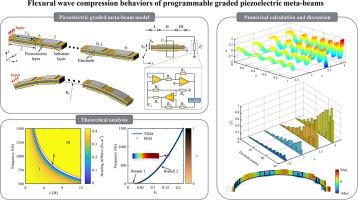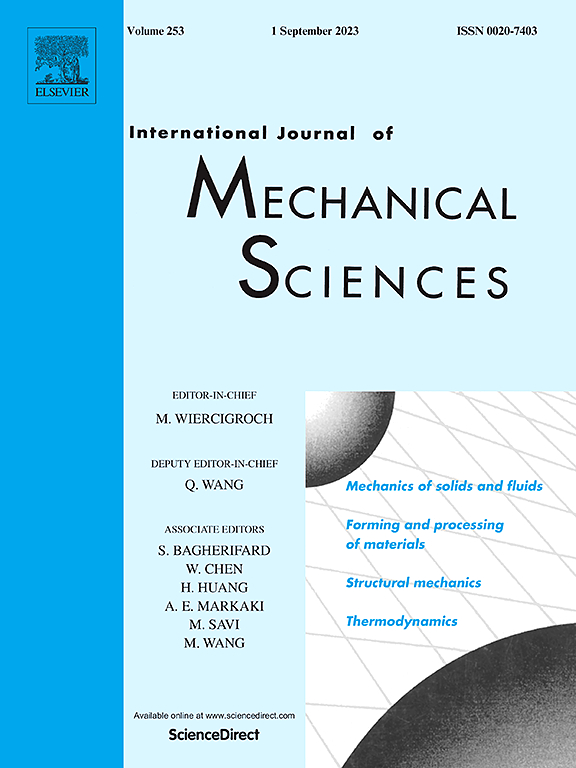Flexural wave compression behaviors of programmable graded piezoelectric meta-beams
IF 7.1
1区 工程技术
Q1 ENGINEERING, MECHANICAL
International Journal of Mechanical Sciences
Pub Date : 2024-09-24
DOI:10.1016/j.ijmecsci.2024.109743
引用次数: 0
Abstract
Active electromechanical metamaterials have drawn significant attention due to their remarkable tunability and adaptability in vibration and wave control. Exploiting the electromechanical coupling effect via controlled biased fields enables precise manipulation of the structural vibrations and wave transmissions. In this research, we have developed a programmable graded piezoelectric meta-beam that successfully imitates the wave compression behavior of an acoustic black hole without modifying the structural geometries. The effective parameters of the meta-beam are reshaped into a gradient distribution by tuning the electrical impedances of the digital shunting circuits. With such graded effective parameters, it becomes feasible to tailor the local wavenumber distribution of the meta-beam and hence achieve the desired wave compression. Numerical results validated our proposed paradigm of the programmable black hole in both straight and curved beams. In contrast to the straight beam, curvature of the curved beam reduces the tunable range of the local wavenumber. A comprehensive parametric study was conducted to investigate the influences of the gradient profile, electric damping, and curvature on the wave control function. For a given desired frequency, programmable control of wave compression location and amplified output of electrical signals are achieved.

可编程分级压电元梁的挠曲波压缩行为
有源机电超材料因其在振动和波控制方面显著的可调性和适应性而备受关注。通过可控偏置场利用机电耦合效应,可以精确控制结构振动和波的传输。在这项研究中,我们开发了一种可编程的分级压电元梁,在不改变结构几何形状的情况下成功地模仿了声学黑洞的波压缩行为。通过调整数字分流电路的电阻抗,元光束的有效参数被重塑为梯度分布。有了这种梯度有效参数,就可以定制元光束的局部波数分布,从而实现所需的波压缩。数值结果验证了我们提出的可编程黑洞范例在直波束和曲波束中的应用。与直光束相比,弯曲光束的曲率减小了局部波长的可调范围。为了研究梯度轮廓、电阻尼和曲率对波控制函数的影响,我们进行了全面的参数研究。对于给定的所需频率,可实现对波压缩位置和电信号放大输出的可编程控制。
本文章由计算机程序翻译,如有差异,请以英文原文为准。
求助全文
约1分钟内获得全文
求助全文
来源期刊

International Journal of Mechanical Sciences
工程技术-工程:机械
CiteScore
12.80
自引率
17.80%
发文量
769
审稿时长
19 days
期刊介绍:
The International Journal of Mechanical Sciences (IJMS) serves as a global platform for the publication and dissemination of original research that contributes to a deeper scientific understanding of the fundamental disciplines within mechanical, civil, and material engineering.
The primary focus of IJMS is to showcase innovative and ground-breaking work that utilizes analytical and computational modeling techniques, such as Finite Element Method (FEM), Boundary Element Method (BEM), and mesh-free methods, among others. These modeling methods are applied to diverse fields including rigid-body mechanics (e.g., dynamics, vibration, stability), structural mechanics, metal forming, advanced materials (e.g., metals, composites, cellular, smart) behavior and applications, impact mechanics, strain localization, and other nonlinear effects (e.g., large deflections, plasticity, fracture).
Additionally, IJMS covers the realms of fluid mechanics (both external and internal flows), tribology, thermodynamics, and materials processing. These subjects collectively form the core of the journal's content.
In summary, IJMS provides a prestigious platform for researchers to present their original contributions, shedding light on analytical and computational modeling methods in various areas of mechanical engineering, as well as exploring the behavior and application of advanced materials, fluid mechanics, thermodynamics, and materials processing.
 求助内容:
求助内容: 应助结果提醒方式:
应助结果提醒方式:


